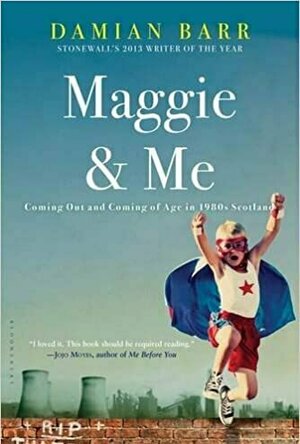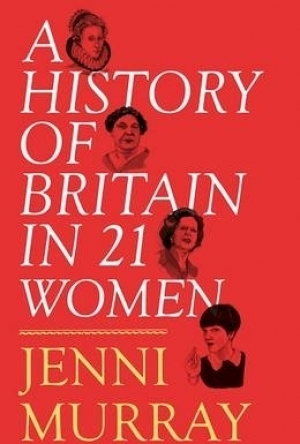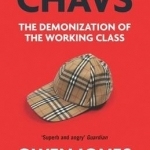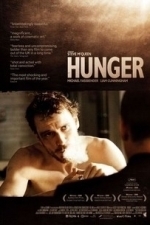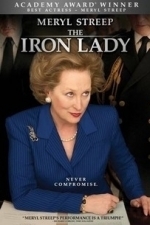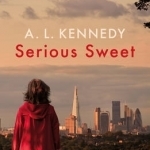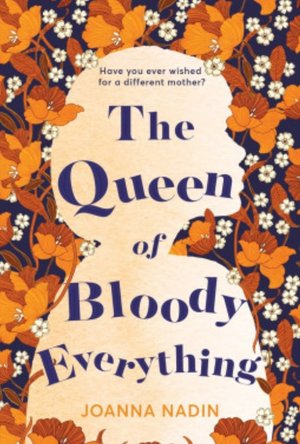Search
Search results
Alan Cumming recommended Maggie and Me in Books (curated)
Jarvis Cocker recommended Basement Five by Basement Five in Music (curated)
Suswatibasu (1703 KP) rated A History of Britain in 21 Women: A Personal Selection in Books
Jul 27, 2017
Almost perfect selection
This would have received the full ten stars if it didn't include Margaret Thatcher and play down the anti-Semitism shown by Nancy Astor.
Absolutely brilliant otherwise, incredibly informative and interesting - and while I did think for a while there was a heavy influence from the Suffragette circle - I believe it was still well deserved. Hats off to Jenni Murray for bringing many of these hidden women to the forefront. And while there was a lack of women of colour, it seems to be the general standpoint for now that they too are invisible.
Absolutely brilliant otherwise, incredibly informative and interesting - and while I did think for a while there was a heavy influence from the Suffragette circle - I believe it was still well deserved. Hats off to Jenni Murray for bringing many of these hidden women to the forefront. And while there was a lack of women of colour, it seems to be the general standpoint for now that they too are invisible.
Suswatibasu (1703 KP) rated Chavs: The Demonization of the Working Class in Books
Oct 1, 2017
Detailed at times, but loses thread in the end
This is an important read in terms of understanding how the current generation of the working class has continued to be victimised especially after the rule of Margaret Thatcher.
From the miners' strikes and Hillsborough, to the modern day label of Chav, the working class have been vilified in order to divide, rule and exploit. Owen Jones explains the ideology fairly well but falls short in providing detailed figures.
And while I agree with most of what he says, including the working class should all stick together, there were some elements that he defends including racists such as Jade Goody, that I could not get on board with. Good, but slightly disappointing.
From the miners' strikes and Hillsborough, to the modern day label of Chav, the working class have been vilified in order to divide, rule and exploit. Owen Jones explains the ideology fairly well but falls short in providing detailed figures.
And while I agree with most of what he says, including the working class should all stick together, there were some elements that he defends including racists such as Jade Goody, that I could not get on board with. Good, but slightly disappointing.
Alec Baldwin recommended Hunger (2009) in Movies (curated)
Movie Metropolis (309 KP) rated The Iron Lady (2012) in Movies
Jun 10, 2019
Meryl Streep certainly has an impressive roster of films under her belt. She’s reduced Anne Hathaway to tears in The Devil Wears Prada, she’s played the role of struggling hotelier in the all singing, all dancing Mamma Mia and has racked up an astonishing 16 Oscar nominations for films like Kramer vs. Kramer and Sophie’s Choice. However, here, she perhaps takes on her biggest role to date portraying arguably the most controversial figure in British politics; Baroness Thatcher. Can she pull it off? Did you really need to ask?
Streep teams up with Mammia Mia director Phyllida Lloyd in the Iron Lady, a biopic surrounding the life of ex-Prime Minister, Margaret Thatcher and between the two of them and a wonderful supporting cast, deliver a stunning but disappointingly safe take on the 86 year olds life.
The film opens with a frail looking woman wandering the streets and buying a bottle of milk, we soon learn that this woman is of course, Baroness Thatcher. After a thought provoking moment of silence, the scene is switched to her current home where she is kept under lock and key, struggling with ever worsening dementia. Her constant conversations with dead husband Dennis, played fabulously by Jim Broadbent are emotional and form the basis of the entire film.
It is in these scenes that we begin to ‘study’ Thatcher’s life from her youth right up until the present day. We see her refusing to give up after failing to gain a seat in the 1950 and 1951 general elections as well as her first steps into Number 10 as the first ever female Prime Minister. Lloyd displays these moments with great finesse and integrates Streep’s portrayal with real footage of Thatcher walking into 10 Downing Street amongst other key moments.
Most of the major events in Margaret’s career are carried over into the film, bar a few notable exceptions. The Grand Hotel bombing, the Falklands war, the death of Thatcher’s personal assistant at the hands of the IRA and of course the controversial Poll Tax all make the grade but are explained in a way that isn’t damaging to the reputation of the Baroness and this is perhaps where the film loses its way a little.
There’ll be no prizes in telling you that Margaret Thatcher was either a fantastic woman who turned around the fates of a country struggling with recession or a woman who nearly destroyed everything we hold dear; depending obviously on your thoughts of her. No matter what thoughts we all have, opinions are opinions. Here, however, the film tries to make up the minds of those watching, rather than allowing an opinion to form on its own and this is perhaps the biggest problem with a political biopic, there is always a sense of bias.
Fortunately, Lloyd stays on the right side of mass appeal and doesn’t give in to mindless brown-nosing.
It is in the films present day moments that really shine. Seeing a woman who wanted to change the world struggle to cope with the loss of her husband and fall into dementia is, no matter what your opinion on the ex-Prime Minister, heart-breaking. It is here, that sympathy is found.
Streep’s performance is stunning to say the least and she is a joy to watch. Her transgression from young, enthusiastic Thatcher to the old and frail woman we see today is yes, in part down to the astonishing make-up given to her throughout but mainly because of her ability as an actress. She, like the lady herself takes charge of every scene she is a part of, something which many actresses struggle to do. Streep may have had her critics in being cast for this film, but she has proved them wrong. It will be a crime if she isn’t nominated for an Oscar this year.
Of the films other cast, Olivia Colman does well as Margaret’s daughter Carole and as mentioned previously, Jim Broadbent is brilliant as the deceased Dennis Thatcher; he fits the role perfectly and again should be nominated for an Oscar later this year. The supporting cast includes the likes of Anthony Head as Geoffrey Howe and Nicholas Farrell as Thatcher’s murdered assistant Airey Neave, but the scenes with these characters are often overshadowed by Streep’s presence.
The Iron Lady is a joy to behold. It makes you proud to be British, to know that we as a country can produce films of this calibre and it shows the world just what a woman Margaret Thatcher was. In the scenes showing Thatcher’s spiral into dementia is where it becomes most touching, but throughout, we get a full, if slightly biased view of her 11 and a half years in office and Meryl Streep does the old girl proud.
Think what you will of the former Conservative leader, but The Iron Lady is worth a watch for Streep’s performance alone.
https://moviemetropolis.net/2012/01/12/review-the-iron-lady-2011/
Streep teams up with Mammia Mia director Phyllida Lloyd in the Iron Lady, a biopic surrounding the life of ex-Prime Minister, Margaret Thatcher and between the two of them and a wonderful supporting cast, deliver a stunning but disappointingly safe take on the 86 year olds life.
The film opens with a frail looking woman wandering the streets and buying a bottle of milk, we soon learn that this woman is of course, Baroness Thatcher. After a thought provoking moment of silence, the scene is switched to her current home where she is kept under lock and key, struggling with ever worsening dementia. Her constant conversations with dead husband Dennis, played fabulously by Jim Broadbent are emotional and form the basis of the entire film.
It is in these scenes that we begin to ‘study’ Thatcher’s life from her youth right up until the present day. We see her refusing to give up after failing to gain a seat in the 1950 and 1951 general elections as well as her first steps into Number 10 as the first ever female Prime Minister. Lloyd displays these moments with great finesse and integrates Streep’s portrayal with real footage of Thatcher walking into 10 Downing Street amongst other key moments.
Most of the major events in Margaret’s career are carried over into the film, bar a few notable exceptions. The Grand Hotel bombing, the Falklands war, the death of Thatcher’s personal assistant at the hands of the IRA and of course the controversial Poll Tax all make the grade but are explained in a way that isn’t damaging to the reputation of the Baroness and this is perhaps where the film loses its way a little.
There’ll be no prizes in telling you that Margaret Thatcher was either a fantastic woman who turned around the fates of a country struggling with recession or a woman who nearly destroyed everything we hold dear; depending obviously on your thoughts of her. No matter what thoughts we all have, opinions are opinions. Here, however, the film tries to make up the minds of those watching, rather than allowing an opinion to form on its own and this is perhaps the biggest problem with a political biopic, there is always a sense of bias.
Fortunately, Lloyd stays on the right side of mass appeal and doesn’t give in to mindless brown-nosing.
It is in the films present day moments that really shine. Seeing a woman who wanted to change the world struggle to cope with the loss of her husband and fall into dementia is, no matter what your opinion on the ex-Prime Minister, heart-breaking. It is here, that sympathy is found.
Streep’s performance is stunning to say the least and she is a joy to watch. Her transgression from young, enthusiastic Thatcher to the old and frail woman we see today is yes, in part down to the astonishing make-up given to her throughout but mainly because of her ability as an actress. She, like the lady herself takes charge of every scene she is a part of, something which many actresses struggle to do. Streep may have had her critics in being cast for this film, but she has proved them wrong. It will be a crime if she isn’t nominated for an Oscar this year.
Of the films other cast, Olivia Colman does well as Margaret’s daughter Carole and as mentioned previously, Jim Broadbent is brilliant as the deceased Dennis Thatcher; he fits the role perfectly and again should be nominated for an Oscar later this year. The supporting cast includes the likes of Anthony Head as Geoffrey Howe and Nicholas Farrell as Thatcher’s murdered assistant Airey Neave, but the scenes with these characters are often overshadowed by Streep’s presence.
The Iron Lady is a joy to behold. It makes you proud to be British, to know that we as a country can produce films of this calibre and it shows the world just what a woman Margaret Thatcher was. In the scenes showing Thatcher’s spiral into dementia is where it becomes most touching, but throughout, we get a full, if slightly biased view of her 11 and a half years in office and Meryl Streep does the old girl proud.
Think what you will of the former Conservative leader, but The Iron Lady is worth a watch for Streep’s performance alone.
https://moviemetropolis.net/2012/01/12/review-the-iron-lady-2011/
David McK (3663 KP) rated Northlight in Books
Jan 30, 2019
I think I read one of these Adam Hall (Elleston Trevor's pen name) Quiller books years ago and wasn't really that impressed, but things (and tastes) change. When this one was recommended to me as being 'better than Ian Fleming' I thought I would give it a second chance. Unfortunately, I now remember why - generally speaking - I don't really read spy novels.
Written and set during the mid 80s, this is the time of the Cold War, when the Iron Curtain was still up and when the Iron lady (Margaret Thatcher) was still in power. In this, Quiller has to go undercover into Soviet Russia to investigate the sinking of a US submarine. Told in first person as Quiller remembering the mission, I found this hard to get into, slow moving and - unfortunately - not really that exciting.
Doubt I'll read any more anytime soon.
Written and set during the mid 80s, this is the time of the Cold War, when the Iron Curtain was still up and when the Iron lady (Margaret Thatcher) was still in power. In this, Quiller has to go undercover into Soviet Russia to investigate the sinking of a US submarine. Told in first person as Quiller remembering the mission, I found this hard to get into, slow moving and - unfortunately - not really that exciting.
Doubt I'll read any more anytime soon.
Stuart Braithwaite recommended Closer by Joy Division in Music (curated)
Eilidh G Clark (177 KP) rated Serious Sweet: Longlisted for the Man Booker Prize in Books
May 13, 2017
This novel is a work of art, l I would expect nothing less from a Man Booker contender.
‘The trouble was, that Margaret Thatcher got her drunk.’
A.L. Kennedy is an award-winning novelist, short story writer, and comedian. Her most recent novel, Serious Sweet, 2016, was long listed for this year’s Man Booker prize. Prior to reading the novel, I read some reviews and was fascinated by their diversity, comments ranging from disappointing to outright marvellous. This told me that I was about to embark on a work of art, after all I would expect nothing less from a Man Booker contender.
The novel is set in the heart of contemporary London and follows its two main characters, John Sigurdsson and Meg Williams through a single day. John is a fickle character, who at 59-year of age, has recently divorced is adulterous wife, and his professional life is hanging in the balance. Working as a senior civil servant in Westminster, he is attempting to uncover some pretty immoral activity. John has a talent for letter writing, this, he finds, is a romantic way to connect to women, whilst otherwise remaining inconspicuous. This is how he meets Meg.
Meg Williams is a 45-year-old bankrupt accountant, now working in an animal shelter because, ‘people who’ve been damaged by people go and work with salvaged animals because the animals have also been damaged by people’ (128). Meg is a victim of sexual abuse from a previous partner, something that we only learn in smatterings throughout the novel. A struggling alcoholic, Meg is on the wagon then off the wagon and blames her more recent fall on Margaret Thatcher, ‘The trouble was that Margaret Thatcher got her drunk.’
While the novel itself can be read as a political satire, and political corruption is plentiful in the narrative, I feel it is simply a back-story. The real story is the unfolding of the human consciousness and the power of the mind. Kennedy shows the reader the power of will through the thoughts of each character, stripping them back to their rawest and purest selves, and showing real courage and hope.
When John and Meg eventually meet at the end of the novel, it is not without some supercharged emotional turmoil. Connecting initially through letter writing, however, allowed the characters to open up their inner thoughts and feelings and gave a platform to be open and honest without the restrictions of reality. This, I believe, is where hope is born in the story.
Watching these two characters evolve was a real delight for me and I feel that Kennedy did the novel justice. You can almost feel each character battle with their own heads while their consciousness’ begins to intertwine. And let us not forget those beautifully written vignettes between chapters. Kennedy has written a wonderful novel, and Serious Sweet, I believe was worthy of its Man Booker place.
A.L. Kennedy is an award-winning novelist, short story writer, and comedian. Her most recent novel, Serious Sweet, 2016, was long listed for this year’s Man Booker prize. Prior to reading the novel, I read some reviews and was fascinated by their diversity, comments ranging from disappointing to outright marvellous. This told me that I was about to embark on a work of art, after all I would expect nothing less from a Man Booker contender.
The novel is set in the heart of contemporary London and follows its two main characters, John Sigurdsson and Meg Williams through a single day. John is a fickle character, who at 59-year of age, has recently divorced is adulterous wife, and his professional life is hanging in the balance. Working as a senior civil servant in Westminster, he is attempting to uncover some pretty immoral activity. John has a talent for letter writing, this, he finds, is a romantic way to connect to women, whilst otherwise remaining inconspicuous. This is how he meets Meg.
Meg Williams is a 45-year-old bankrupt accountant, now working in an animal shelter because, ‘people who’ve been damaged by people go and work with salvaged animals because the animals have also been damaged by people’ (128). Meg is a victim of sexual abuse from a previous partner, something that we only learn in smatterings throughout the novel. A struggling alcoholic, Meg is on the wagon then off the wagon and blames her more recent fall on Margaret Thatcher, ‘The trouble was that Margaret Thatcher got her drunk.’
While the novel itself can be read as a political satire, and political corruption is plentiful in the narrative, I feel it is simply a back-story. The real story is the unfolding of the human consciousness and the power of the mind. Kennedy shows the reader the power of will through the thoughts of each character, stripping them back to their rawest and purest selves, and showing real courage and hope.
When John and Meg eventually meet at the end of the novel, it is not without some supercharged emotional turmoil. Connecting initially through letter writing, however, allowed the characters to open up their inner thoughts and feelings and gave a platform to be open and honest without the restrictions of reality. This, I believe, is where hope is born in the story.
Watching these two characters evolve was a real delight for me and I feel that Kennedy did the novel justice. You can almost feel each character battle with their own heads while their consciousness’ begins to intertwine. And let us not forget those beautifully written vignettes between chapters. Kennedy has written a wonderful novel, and Serious Sweet, I believe was worthy of its Man Booker place.
ClareR (6037 KP) rated The Queen Of Bloody Everything in Books
Sep 9, 2018
A challenging mother/ daughter relationship.
This starts in 1976 and really captures the feelings and experiences of someone growing up through the 1970s and 1980s in the UK. There are so many familiar cultural references: from Margaret Thatcher to Mivvi ice lollies.
I listened to this through Audible, and I think the narrator was exactly the right choice. Dido, the main character, starts off as a six year old in 1976. We follow her through a difficult childhood with her single, bohemian, hard and fast living mother, Edie, in a very conservative small town. There are times where I wondered who the adult actually was. There is no doubt that Dido loves her mother no matter how difficult she is, but it's also evident that she is largely responsible for the direction that Dido's life takes. Dido is mainly cared for by the Trevelyans, who she meets on the day she and her mother move in to the house left to Edie in her aunts will. Mrs Trevelyan is clearly disapproving of Edie (as are a lot of people in their small town). Dido attempts to become part of the Trevelyan family, and she does succeed in time.
I loved all of these characters and the way their lives played out, and I think the use of the first person narrative was really effective. A really lovely book.
I listened to this through Audible, and I think the narrator was exactly the right choice. Dido, the main character, starts off as a six year old in 1976. We follow her through a difficult childhood with her single, bohemian, hard and fast living mother, Edie, in a very conservative small town. There are times where I wondered who the adult actually was. There is no doubt that Dido loves her mother no matter how difficult she is, but it's also evident that she is largely responsible for the direction that Dido's life takes. Dido is mainly cared for by the Trevelyans, who she meets on the day she and her mother move in to the house left to Edie in her aunts will. Mrs Trevelyan is clearly disapproving of Edie (as are a lot of people in their small town). Dido attempts to become part of the Trevelyan family, and she does succeed in time.
I loved all of these characters and the way their lives played out, and I think the use of the first person narrative was really effective. A really lovely book.
